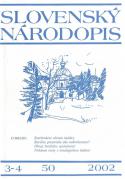HODNOTY V PROCESE TRANSFORMÁCIE A POSTMODERNÁ KULTÚRA
VALUES IN THE PROCESS OF TRANSFORMATION AND POSTMODERN CULTURE
Author(s): Zuzana ProfantováSubject(s): Recent History (1900 till today), Cultural Anthropology / Ethnology, Sociology of Culture
Published by: Ústav etnológie a sociálnej antropológie Slovenskej akadémie vied
Keywords: values; process of transformation; post-modern culture;
Summary/Abstract: As a result diversity of values, their multivalent aspect and insufficient permanent and stable value hierarchy, contemporary culture at the beginning of the third millennium is characterized by various attitudes, lifestyles, different practiced ideologies, etc. It is the outcome of the lost confidence in monolithic ideologies and the institutions, which are representing them. Reaction to distant monolithic and mono-centrist aspect is tendency of polycentrism. It means diffusion and disintegration in praxis. In human consciousness this results into a status called chaos, disorder, confusion, provoking not only relativism but even nihilism. On one hand human being nowadays is traumatized by fundamentalism, on the other hand there is a fear from overwhelming variety of axiological propositions. Theoreticians of culture characterize it as change-over from modern to post-modem era. The problem is whether it is a continual transition or drastic cultural leap. It is also important if it is possible to keep in touch with tradition, traditional values but also with those, which are connected with resentment, that is in accord with national identity. Herewith I understand traditional folk culture, folklore. Everyday values characterize everyday aspirations of people, influencing their actions in praxis and giving their life sense. They are connected with everyday situations. These are e.g. values considered when deciding about the goal of tile (e.g. wealth, fame), values giving sense to life (e.g. love, family happiness) and also values determining quality of contacts between people (e.g. goodwill, trust). Certain values in the life of an individual are always dominant, other are mitigated, but that does not mean It is a stable situation. The structure of value hierarchy has a dynamic character. In the concrete research, which started in 1998 I was studying inter alia opinions on disproportion, in other words, traditional values in opposition to currently preferred values. The traditional values in the Slovak society were for a long time considered family, familiarity - i.e. strong family lights, also in broader family, love towards children and taking care of them, hospitality, cordiality, peacefulness, work, modesty, health, religiousness, important role of a woman-mother, generosity, respect to moral authorities, traditionalism, traditional folk culture, sensibility, seeking national emancipation and morality, etc. Preliminary outcomes of the research show that there is a tendency of strong disillusion in today’s society, as those most highly cherished values are nowadays loosing their credit as well as dominant position. On the basis of the above mentioned values (as well as the illustration comments), which from my point of view could he regarded as traditional, I assume that tradition in the current cultural-historical situation is being depreciated. Meaning of tradition is gaining a negative aspect and it is evaluated as an idle actor in the social life and culture, and it is becoming a metaphor for a hindrance to progress. This is one side of the problem. On the other hand, there are followers of tradition, who are calling for its survival and continuity, and for whom it is antidote against current new and post-modem tendencies. The world, which human beings build for them in this way, is very often inimical and unsuitable. Human beings do not control values, on the contrary, values control people, stimulate their actions, and also their thinking, which in the end creates a “vicious circle”. The change of ideology triggered off mechanism of transformation, which was restructuralising culture and thus intensely attacking usual value signs. Change of culture is a change of behavioral learned patterns, that leads to tendency of polycentricity.
Journal: Slovenský národopis
- Issue Year: 50/2002
- Issue No: 3(4)
- Page Range: 346-351
- Page Count: 6
- Language: Slovak

